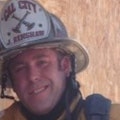When a fire department welcomes in a new fire chief, either through internal promotion or hired from the outside, it’s a momentous time for everyone. With a new chief comes that “breath of fresh air” that brings with it new ideas, visions and goals and a different perspective. This is extremely important, particularly for agencies that plateaued and became stagnant.
It’s common that new chiefs were mentored and absorbed a lot of what they know by watching people who were in positions above them. However, it’s likely that they took it upon themselves to learn and to grow through education, too.
Lt. Gen. Harold G. Moore co-authored the 1992 book “We Were Soldiers Once … And Young.” The book was adapted into a movie, “We Were Soldiers,” which was released in 2002. Mel Gibson plays Lt. Col. Hal Moore, who was in charge of the 1st Battalion, 7th Cavalry Regiment of the U.S. Army at the battle of Ia Drang, Vietnam, in November of 1965. The movie highlights the training that the 1st Battalion went through, the battle of Ia Drang and the effects that the battle had at home. During one of the training scenes, soldiers practice disembarking helicopters while taking enemy fire. As a helicopter lands, Gibson’s character immediately engages the crew on board. He pulls the crew’s officer out of the helicopter and informs the crew that their officer “was killed.” He asks them what do they do now? Moments later, during a critique of the training scenarios, Gibson’s character states, “You learn the job of the man above you and teach your job to the man below you in rank, and that goes for every man in this outfit.” This same mantra has been echoed untold times in fire departments, and it’s the basis for mentoring and for being prepared for taking that next step.
What happens when you achieve the rank of fire chief? What now becomes the rank that’s above you? What now is the rank that you must learn and prepare for?
With rank structure comes knowing about and navigating the vertical axis, but to be an effective manager and leader, you also must navigate the horizontal axis that exists in municipal government.
Vertical & horizontal axis
For most new fire chiefs, who are dependent on department makeup and structure, their promotion means that they not only are the head of their agency but also are part of their municipality’s management team. Of course, this management team consists of multiple components and levels and differing disciplines.
The fire chief now must be aware of and engage both the vertical axis and the horizontal axis, with the vertical being the bosses and the horizontal being the peers.
Looking at the vertical axis, the fire chief typically encounters a municipal manager, a governing board, such as a council or supervisors, and, of course, the citizens. The fire chief typically reports to the municipal manager. That person is responsible for the day-to-day operations of the municipality, with all department heads as direct reports.
The municipal manager usually is appointed or hired by the governing board and receives direction from them. The manager acts in a very similar capacity within the municipal government as the fire chief acts within the fire department. This includes involvement in the development of policies and procedures, budget preparation and execution, and hiring and firing and having to answer for all aspects of administration and operations. Being effective in this position requires the municipal manager to have a basic understanding of how all of the departments in the municipality work. That said, the municipal manager mostly relies on department heads to provide guidance and direction.
The horizontal axis is made up of the heads of all of the departments within the municipal government. This can vary greatly, but some typical functions that are found besides the fire department are police, emergency medical services, public works, finance, human resources, and parks and recreations. Department heads find themselves seeing each other and working together often, particularly if their municipality has a strong presence in the community. Their encounters increase during budget time, as each department head will present the department’s case for needed funding.
Outside-of-the-box prep
To paraphrase Mel Gibson’s character in “We Were Soldiers,” “Learn the job of the person who’s above you.” The fire chief should look at the step that’s directly above in the vertical axis, the municipal manager. To be an intricate part of the management team, the chief also must learn as much as possible about the job of fellow department heads. There are numerous ways that this can be accomplished, with the informal being via what transpires in meetings, a review of job descriptions and, simply, asking questions. However, what is out there formally in the higher education setting is important.
A great starting point is to review the National Professional Development Matrix, published by the Fire and Emergency Services Higher Education (FESHE) initiative. This matrix covers multiple educational recommendations and the officer level to which they correspond. These levels traditionally are found in most departments, with the matrix spanning from junior officer all of the way up to fire chief. It also covers competencies, recommended National Fire Academy courses, and, most importantly, higher education (college-level) courses. Some of the classes that are listed are American government, public speaking, public finance & budgeting, management in the public sector and decision-making for public managers. Fire chiefs who actively are working toward or who obtained an FESHE-approved degree likely took some, if not all, of these courses. This is a great way to obtain knowledge of the position that’s above you on the vertical axis—even if you don’t realize it at the time.
Another formal option is for the fire chief to pursue a master’s degree in public administration. A search of job openings on the International City/County Management Association website (icma.org) reveals multiple government-related positions. As you review the skills and qualifications section of the posts for management-level positions, you will find that the degree that’s required is a master’s degree, typically in a related field, and preference is given to a person who has a master’s in public administration. A master’s in public administration encompasses the requisite knowledge that municipal managers need to perform in their job, but it also lays the foundation for them to develop the needed skills to continue to be effective.
Whether a fire chief obtains a master’s degree in public administration or another degree that involves FESHE-approved classes, the chief will be educated on how government works, how a chief fits into the big picture and how to create better working relationships with others who are in the municipal management team. That said, figuring out how to work with those who are in both the vertical and horizontal axes depends on the individual fire chief.
With the multitude of resources that are available and prior training received, overall success is a very obtainable goal, which isn’t a benefit only to the chief but also to the agency and the citizens.
About the Author

Jared Renshaw
Jared Renshaw has more than 20 years of experience in the fire service. He started his fire service career with the Fairview Volunteer Fire Department in South Fayette Township, PA. Renshaw also served with career departments in South Carolina and California and since 2015 has served as the fire commissioner with the Western Berks Fire Department in Berks County, PA. He holds a bachelor's degree in fire service administration and is designated as a Chief Fire Officer through the Center for Public Safety Excellence (CPSE). Renshaw served as a member of the board of directors for the Pennsylvania Fire and Emergency Services Institute. He is a member of the advisory boards for Firehouse and FireFusion.
